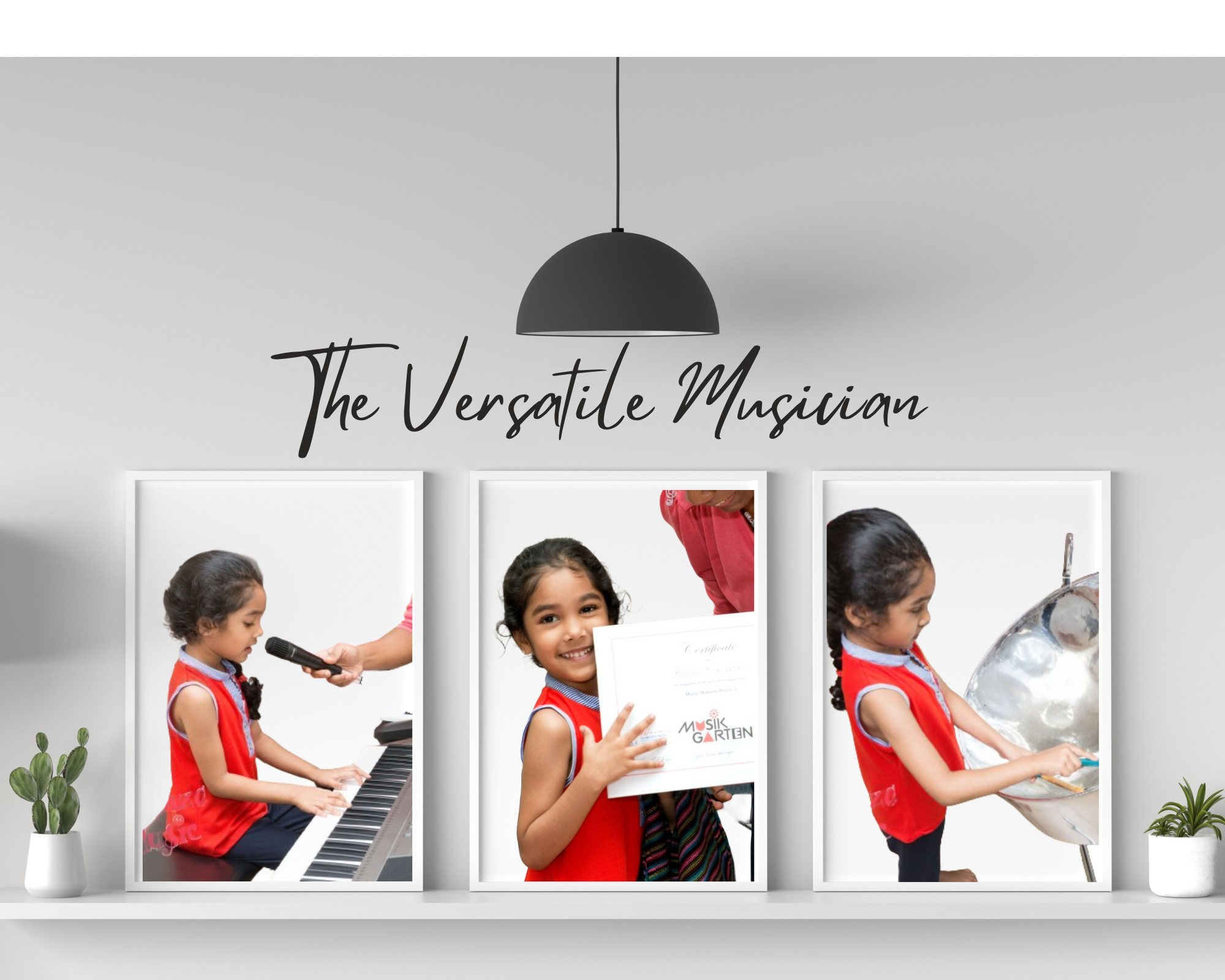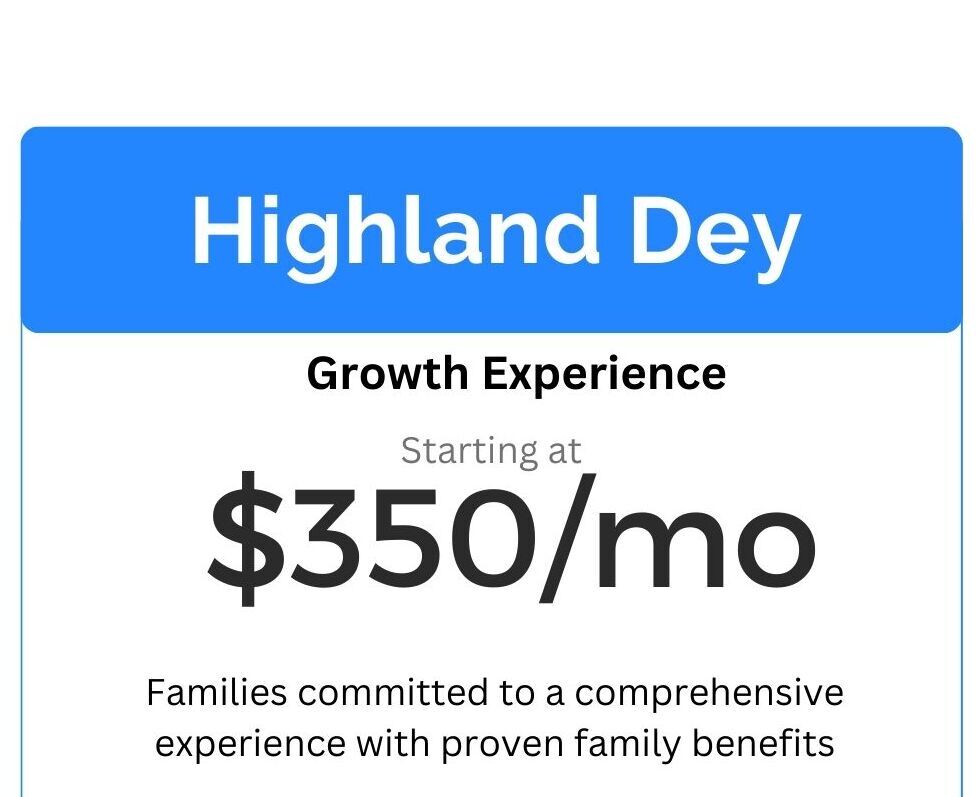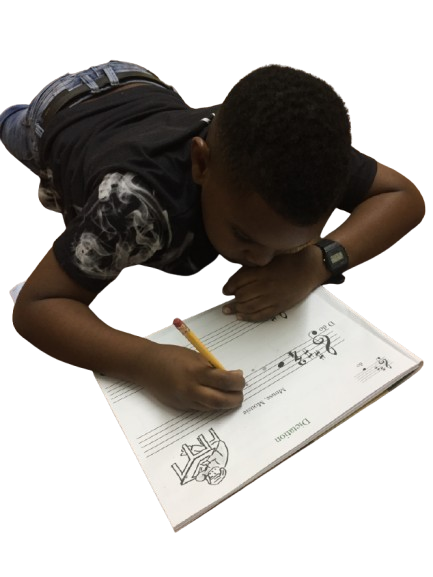
If the sky is the limit, let your child fly musically!
Why settle for mundane music lessons where your child is stuck decoding notes on sheet music at the instrument, then doing a truckload of theory, when your child could be delightfully engaged towards becoming an all-round musician!
What makes our classes more valuable to your child than typical music lessons?
Our classes offer comprehensive music education, to ensure a holistic learning experience. We measure success by versatility - with musicianship as the hallmark of true music literacy.
A dynamic music class that layers on multiple components at the appropriate pace in a fun and engaging way with musical friends is a stronger motivator for practice than a music lesson that resembles the rigid system of school, sitting for long periods reading and writing.
How do we nurture versatility?
Through structured lessons supported by our research-based Musikgarten® curriculum, we engage in multi-sensory group music-making activities which can boost your child's confidence, providing comprehensive support for your child's development across multiple areas including:
- musical acuity and versatility
- culturally diverse repertoire
- critical listening skills
- faster memorisation
- higher order analytical ability
- focus and discipline
- communication and expression
- having fun!
How soon will my child be able to play a song?
From day one! Subsequently, your child will be led to figuring out chords and melodies by ear to familiar favourites, playing music from around the world including our local Folk, Calypso and Parang, creating compositions, sight singing their music without any need for an instrument, improvising in a live band setting, doing musical dictation (transcription), musical analysis and YES they can read music too... skills even some Grade 5 / CXC music students only get exposed to at University level!
Is this approach to music education recognised?
Just as in language, children first learn to understand and "speak" music through listening and audiation (hearing music in their minds), before they learn to read and write it. Our programme is largely based on Edwin Gordon’s Music Learning Theory (GMLT), which emphasizes developing musical literacy through a structured sequence of learning.
This well-established approach is taught in education programmes at University level, but so many teachers are entrenched in the traditional, they dust this off and revert to the dogmatic method.
A music class that's based on this approach ensures that students don’t just memorise symbols but truly understand the music they are playing or reading, fostering a deep level of musical literacy.

Hear from Our Parents
I remember when she started (on the keyboard) I wondered if she was picking up anything at all. Then one day.. playing around with the (steel)pan sticks, she was like
"Look Daddy! I could play Listen for Bells (song) on the (steel)pan too!"
And listen and play by ear... Those were the moments when I realized YES she was really picking up.
Amia's Dad
NEW FAMILIES
Introductory Pkg

What's Included
* Family Registration
($100)
* ONE (1) Parent Orientation Session
* TWO (2) Interactive, Fun Sessions ($150/session)
* Music & Movement Experience with Multilanguage Exposure
* Obligation-free Session
* Preview Musikgarten® Resources
* Priority Booking
* Semester Upgrade Available
Class Duration
1 hour
Location
TUNAPUNA
Schedule
Enquire within
Cancellation Policy
Introductory Pkg Bookings are non-refundable.
One reschedule per Semester is allowed (subject to availability) if:
1) Day-before notice is given by 5:00pm
2) Same-day notice for illness/emergencies only
MEMBER FAMILIES
Semester Stay

What's Included
* Five-month Semester
* Fun Multilingual Music & Movement
* Premium Musikgarten® Family Kit
* Full Access to E-learning Resource*
* Musikgarten® Certification
* Personalised Progress Feedback
* Extra Learning Support via WhatsApp
* Bonus Content & Parent Ed
* Exclusive Member Discounts
* Flexible Payment Options
* Complimentary Vacation Session
What are the proven brain benefits for my child?
The latest brain research suggests that long-term and complex musical learning in piano and voice can strengthen white matter connectivity networks related to language and emotions.
With that knowledge, we're excited to welcome you aboard the most comprehensive music programme that aims to develop students' musical ability across complementary disciplines. This class empowers students with a broad range of musical skills, personal growth, and cultural appreciation, providing them with a solid foundation to pursue diverse musical endeavors and contribute meaningfully to the world of music.
What should we expect to happen musically?
By the end of the Versatile Piano, Voice, and Steelpan Class, students will have developed functional skills in piano playing, vocal techniques, and/or steelpan performance and will be well-prepared to perform in various live musical settings and showcase their talents as truly versatile young musicians, capable of captivating and expressive performances at the piano, voice, and/or steelpan through a culturally diverse repertoire of music.
This class empowers students with a broad range of musical skills, personal growth, and cultural appreciation, providing them with a solid foundation to pursue diverse musical endeavors and contribute meaningfully to the world of music.



What does this class entail?
This specialised Year-long group class at each level, follows a very sequential approach to building keyboard, vocal, steelpan skills and understanding musical notation. In this class you'll need to own/have easy access to the primary instrument - a keyboard with the appropriate stand and bench.
Versatile at the Piano, Voice, Steelpan students are often excited to come to class, ready to play! This is a dynamic and comprehensive programme designed to nurture students' playing abilities and enable them to become proficient, adaptable, and versatile musicians.
For children progressing from Pre-Piano Classes, this programme is designed to teach the children to play the songs they've been hearing, singing and dancing to throughout the years of early-childhood; it is the final step on the pathway to music literacy
What are some of the activities?
We'll be
Playing Songs by ear
Sight-singing | Sight reading | Reading Sheet music
Composing | Doing Dictation | Improvising
Aural Recognition Games | Drumming | Dancing
Mystery Songs | Stories about Composers
and so much more!
Why group and not individual classes?
Classes in groups allow the children to experience the delight in making music with others, while at the same time encouraging the development of rhythmic competency, listening skills, singing, and music-reading. In addition, learning melodies, scales and chords on the instruments, helps improve more difficult fine and gross motor skills.
Doing solos (individual renditions) within a group setting, often helps children to manage and overcome performance anxiety.
What to expect at each Level?

Intro to Versatile at the Piano
Overview: Children will be introduced to playing in D major 5 finger position and the I and V7 chords to accompany their songs.

Versatile At the Piano, Voice, Pan - Level 1
Throughout the entire year, children will become familiar with D, C and G major 5 finger positions as well as d and e minor. They will be introduced to the I and V7 (also i and v7) chords to accompany their songs.
Transposing their repertoire to all known positions is encouraged as each new position is introduced.

Versatile At the Piano, Voice, Pan - Level 2
Throughout the year, the children will become comfortable with D,C,G, add E, Fmajor 5 finger positions as well as d, e as well as c, f minor. They will be introduced to the I and IV,V7 (also i and v7) chords to accompany their songs.
Transposing their repertoire to all known positions is encouraged as each new position is introduced.

Versatile At the Piano, Voice, Pan - Level 3
Playing by ear continues throughout the year, but reading activities are more plentiful. This expanded role of reading music is found not only in the Children's Book but also in the sight-reading cards and notation games. We continue to develop piano technique including staccato & legato, chord positions as well as Improvisation.

Keep the learning going at home
We encourage and support continued musical play and learning at home with families.
We'll provide you with important information on children's (musical) development and access to our e-learning page with suggested home activities and video guides.
You'll also have your Children's Course Book, Notation Games, Digital Downloads for Practice CD & Listening CD with quality recordings, Parent Guide Book (highly recommended) for use at home to increase family involvement and foster the discipline of practice.
<<the strongest foundation for music literacy is a music education that includes singing, dancing, playing by ear and inventing ways to represent familiar and original songs and that skill in representing music symbolically may transfer to tasks in other domains as well.>>
The National Coalition for Core Arts Standards, USA.


